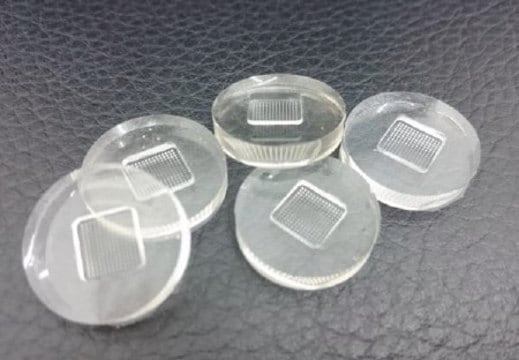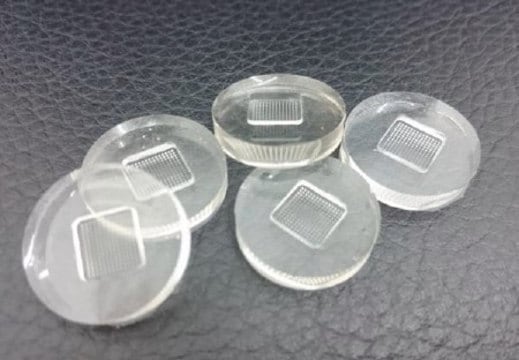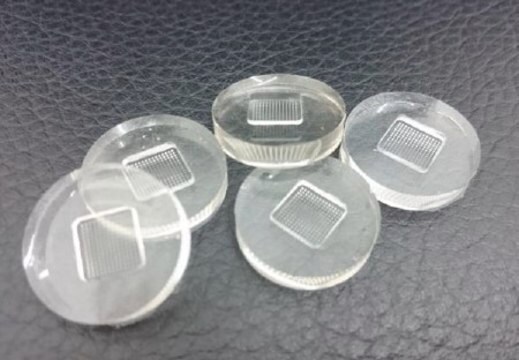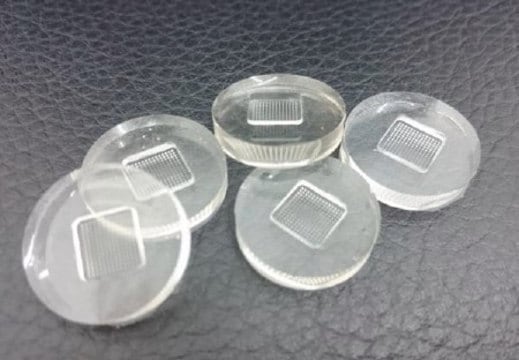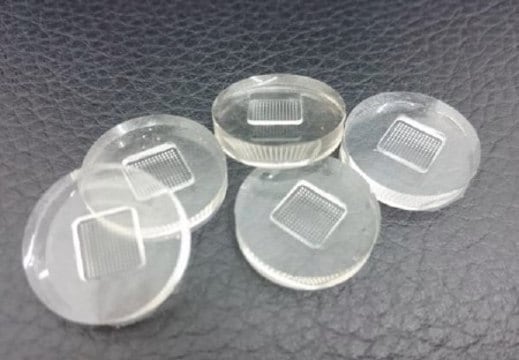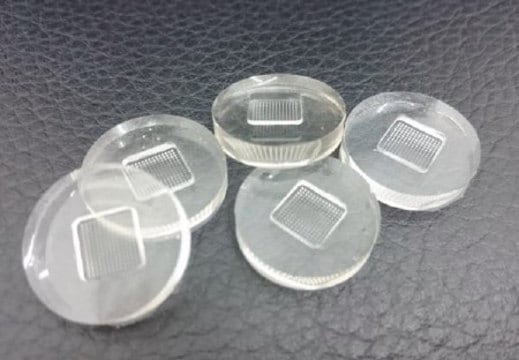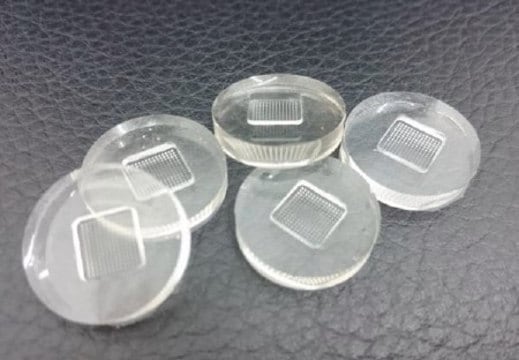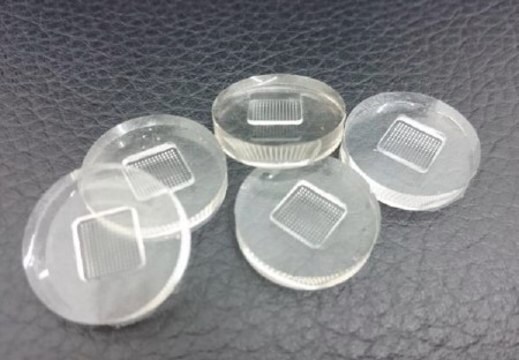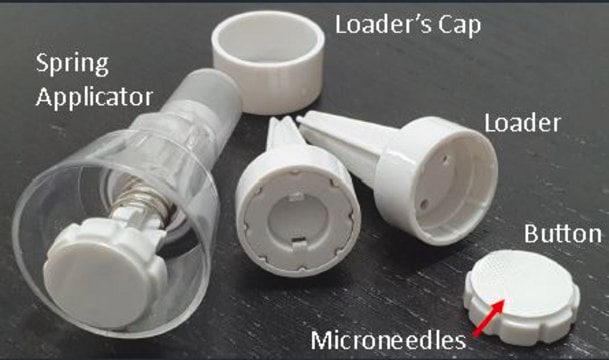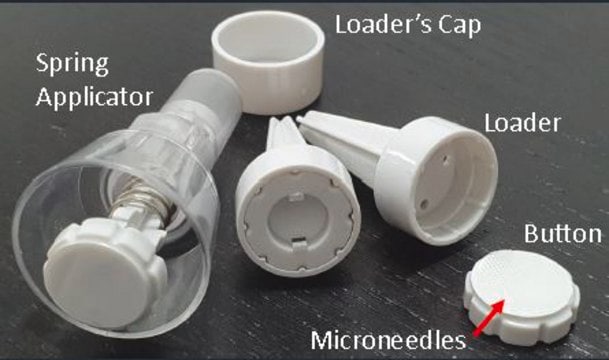934488
Microneedle template
10x10 array, H 500 μm, base size 200 μm, 500µm pitch
Sign Into View Organizational & Contract Pricing
All Photos(2)
About This Item
UNSPSC Code:
44111809
NACRES:
NA.21
Recommended Products
H
500 μm
base size
200 μm
Looking for similar products? Visit Product Comparison Guide
General description
Microneedles are a platform for transdermal drug delivery. The advantages of microneedles include the delivery of large molecules, painless and less invasive adminsitration of the active pharmaceutical ingredient (API), ease of administration, and improved drug delivery including dose, delivery rate and efficacy. Microneedies are also effective for vaccine delivery due to the abundance of immune cells in the dermis. These microneedle templates can be used to make reproducible and high quality microneedle patches for a variety of therapuetics.
Application
Transdermal delivery of a variety to therapeutics including:
Nucleic acid delivery
Vaccine delivery
Protein or peptide delivery
Small molecule delivery
Nucleic acid delivery
Vaccine delivery
Protein or peptide delivery
Small molecule delivery
Features and Benefits
Microneedle templates are exclusively made for producing dissolvable microneedle patches with excellent qualitty and repeatability. These templates are made of silicone rubber which is extremely durable, and chemical and heat resistant.
Physical properties
Microneedle template properties:
- Silicone Template
- Material: PDMS
- Patch Size (D): 8mm x 8mm
- Array Size: 10 x 10
- Needle Height (A): 500 µm
- Needle Base (B): 200 µm
- Needle Pitch (C): 500 µm
- Length of last microneedle cavity to the edge of the patch (F) can be calculated using the following formula: F = (patch size - [(n-1) x pitch)] / 2 where n = number of microneedles in one array
- Sterilization: Autoclave (optional)
- No. of use: repeated use if clean and stored properly
Other Notes
Suggested instructions for use:
1. Ensure the microneedle template is clean by washing with mild soap and letting them air dry completely
2. Pipette a small quantity (50-100 µL) of the drug mixture onto the microneedle template
3. Subject the template to cenrifugal force for >60 seconds to ensure that alll microneedle cavities are completely filled. The speed and duration are proportional to the viscosity of the matrix material and the volume of microneedle cavities to fill. Complete filling can be confirmed by observing the microneedle cavities under microscope (20x). No air bubbles are present for complete filling.
1. Ensure the microneedle template is clean by washing with mild soap and letting them air dry completely
2. Pipette a small quantity (50-100 µL) of the drug mixture onto the microneedle template
3. Subject the template to cenrifugal force for >60 seconds to ensure that alll microneedle cavities are completely filled. The speed and duration are proportional to the viscosity of the matrix material and the volume of microneedle cavities to fill. Complete filling can be confirmed by observing the microneedle cavities under microscope (20x). No air bubbles are present for complete filling.
related product
Product No.
Description
Pricing
Certificates of Analysis (COA)
Search for Certificates of Analysis (COA) by entering the products Lot/Batch Number. Lot and Batch Numbers can be found on a product’s label following the words ‘Lot’ or ‘Batch’.
Already Own This Product?
Find documentation for the products that you have recently purchased in the Document Library.
Jie Xu et al.
Molecules (Basel, Switzerland), 26(19), 5912-5912 (2021-10-14)
A microneedle (MN) is a painless and minimally invasive drug delivery device initially developed in 1976. As microneedle technology evolves, microneedles with different shapes (cone and pyramid) and forms (solid, drug-coated, hollow, dissolvable and hydrogel-based microneedles) have been developed. The
Ying Hao et al.
Journal of biomedical nanotechnology, 13(12), 1581-1597 (2018-03-02)
A microneedle (MN) is a micron-sized needle with a height of 10-2000 μm and a width of 10-50 μm, which can penetrate through the epidermis layer to dermal tissue directly without pain. Microneedles are widely used in transdermal drug delivery
Ziad Sartawi et al.
Journal of controlled release : official journal of the Controlled Release Society, 348, 186-205 (2022-06-07)
Microneedles are a rapidly developing method for the transdermal delivery of therapeutic compounds. All types of microneedles, whether solid, hollow, coated, or dissolving function by penetrating the stratum corneum layer of the skin producing a microchannel through which therapeutic agents
Ipshita Menon et al.
Micromachines, 12(4) (2021-05-01)
Transdermal vaccination route using biodegradable microneedles is a rapidly progressing field of research and applications. The fear of painful needles is one of the primary reasons most people avoid getting vaccinated. Therefore, developing an alternative pain-free method of vaccination using
Tejashree Waghule et al.
Biomedicine & pharmacotherapy = Biomedecine & pharmacotherapie, 109, 1249-1258 (2018-12-16)
The most widely used methods for transdermal administration of the drugs are hypodermic needles, topical creams, and transdermal patches. The effect of most of the therapeutic agents is limited due to the stratum corneum layer of the skin, which serves
Our team of scientists has experience in all areas of research including Life Science, Material Science, Chemical Synthesis, Chromatography, Analytical and many others.
Contact Technical Service